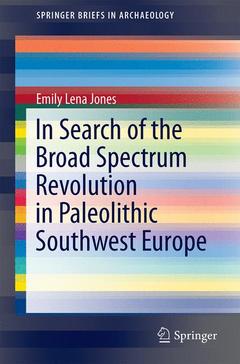In Search of the Broad Spectrum Revolution in Paleolithic Southwest Europe, 1st ed. 2016 SpringerBriefs in Archaeology Series
Auteur : Jones Emily Lena

The people who inhabited Southwest Europe from 30,000 to 13,000 years ago are often portrayed as big game hunters ? and indeed, in some locations (Cantabrian Spain, the Pyrenees, the Dordogne) the archaeological record supports this interpretation. But in other places, notably Mediterranean Iberia, the inhabitants focused their hunting efforts on smaller game, such as rabbits, fish, and birds. Were they less effective hunters? Were these environments depleted of red deer and other large game? Or is this evidence of Paleolithic people?s adaptability?
This volume explores these questions, along the way delving into the history of the ?bigger equals better? assumption; optimal foraging theory and niche construction theory; and patterns of environmental and subsistence change across the Pleistocene-Holocene transition.
Chapter 1: Paleolithic people, Paleolithic landscapes.- Chapter 2: Big game, small game: why it matters.- Chapter 3: Climate and environment in Late Paleolithic Southwestern Europe.- Chapter 4: Human subsistence and the archaeofaunal record of Late Paleolithic Southwest Europe.- Chapter 5: Archaeofaunal diversity and broad spectrum diets in Late Paleolithic Southwest Europe.- Chapter 6: Was there a Broad Spectrum Revolution in Southwest Europe?.
Explains the logic of the foraging theory and its proposed alternative, the niche construction theory
Explores the subsistence and settlement behavior of hunter-gatherers in various environments
Discusses the current state of Broad Spectrum Revolution research by introducing paleoenvironmental data in addition tolandscape analysis and zooarchaeology
Date de parution : 10-2015
Ouvrage de 91 p.
15.5x23.5 cm



